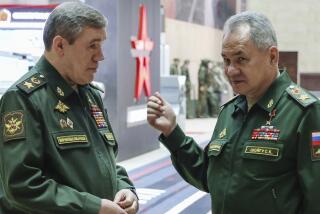Tribunal Indicts Serb Leaders for War Crimes
- Share via
THE HAGUE — The United Nations’ tribunal on Balkan war crimes issued long-awaited indictments Tuesday against Bosnian Serb leader Radovan Karadzic and his military chief, Gen. Ratko Mladic, charging them with genocide, war crimes and crimes against humanity.
Also indicted were Milan Martic, leader of militant Serbs who control a large swath of territory in neighboring Croatia, and 21 other Bosnian Serbs and Croatian Serbs.
Martic was accused of war crimes for allegedly ordering rocket attacks against civilians in downtown Zagreb, the Croatian capital, in early May. The rockets, armed with cluster bombs, killed seven people.
The indictment of the two leading Bosnian Serbs, expected since May, was more extensive. It charged that, among other things, they furthered the internment of thousands of non-Serbs in concentration camps, where the prisoners were subjected to inhumane conditions and where many died.
Richard Goldstone, a respected South African jurist and the lead prosecutor for the U.N. War Crimes Tribunal, argued that this and other actions amounted to genocide, because the Bosnian Serbs acted “with intent to destroy, in whole or in part, a national, ethnic or religious group.”
Among other Bosnian Serb-run detention facilities, the indictment named the notorious Omarska camp in northwestern Bosnia, which was closed amid a huge international outcry late in the summer of 1992.
Journalists had reported that numerous atrocities had been committed at Omarska, and television stations around the world broadcast images of gaunt, demoralized men trapped behind its barbed-wire fences, looking eerily similar to the famous photographs of Nazi concentration camp victims rescued half a century before.
That publicity led to the creation of the U.N. tribunal in 1993. It is expected to hold the world’s first international war-crimes trials since the proceedings at Nuremberg and Tokyo after World War II.
Tuesday’s indictment also charged Karadzic and Mladic with responsibility for the shelling of Sarajevo, as well as the smaller Bosnian towns of Tuzla and Srebrenica, “in order to kill, terrorize and demoralize the Bosnian Muslim and Bosnian Croat civilian population.”
And it blamed the two men for abetting the “systematic” campaign of sniping at civilians in Sarajevo over the past three years and for the seizure and use as human shields of 284 U.N. peacekeepers in May and June.
As a practical matter, the newly indicted Serbian leaders--and the lower-ranking accused, most of them detention camp guards, local politicians, police and paramilitary fighters--are no closer to trial or conviction than they were before the indictments were issued. Under law, the tribunal must now serve the indictments. Court officials were unable Tuesday to say just how they could do that, because Karadzic, Mladic and the rest are living in Serb-controlled parts of Bosnia, beyond the reach of any non-Serbian law-enforcement authorities.
“We will ask a national authority to do it for us,” said tribunal spokesman Christian Chartier, adding that the court could ask Geneva- or Belgrade-based representatives of the Bosnian Serbs to serve the papers.
But the Bosnian Serbs have never cooperated with the tribunal before. On the contrary, they have condemned its proceedings as anti-Serbian “show trials.” There is no reason to think the Bosnian Serb authorities would take any step that could lead to the arrest of their leaders just because new indictments have been issued.
In cases where accused war criminals cannot be apprehended, the tribunal has no power to try them in absentia. It can only create three-judge panels to consider whether the indictments are justified and, if so, to issue international arrest warrants. This will presumably happen in the cases of Karadzic and Mladic.
If such warrants are issued, Goldstone said in a recent interview, the U.N. Security Council can take steps, including economic sanctions, against member nations that help the indicted leaders evade arrest.
The only alleged Bosnian war criminal taken into custody so far has been Dusan Tadic, a low-level Serbian militant who frequented the Omarska camp in the summer of 1992. He is charged with having killed, beaten and raped inmates there, but no one claims he did so in any official capacity.
Goldstone also responded Tuesday to the Bosnian Serb argument that the tribunal has been one-sided, focusing its efforts solely on Serbs. He said he expects to issue war-crimes indictments against Bosnian Croats by the end of the year. His staff, he said, is also investigating alleged crimes by Bosnian Muslims.
More to Read
Sign up for Essential California
The most important California stories and recommendations in your inbox every morning.
You may occasionally receive promotional content from the Los Angeles Times.













